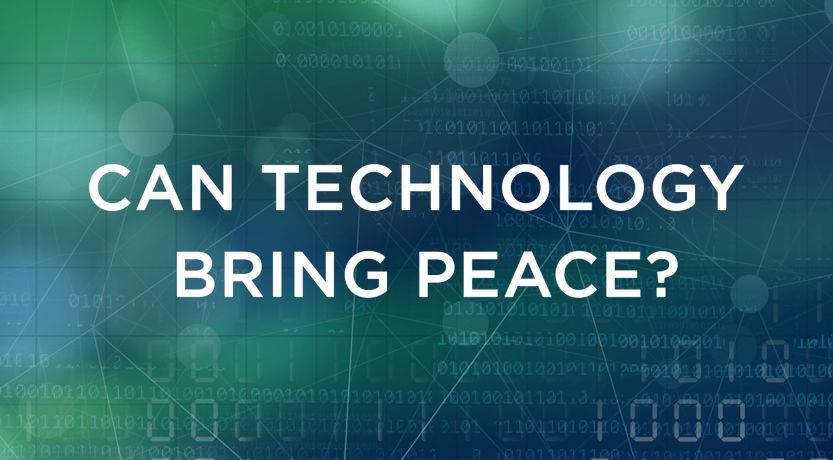Can Technology Bring Peace?
Mankind has made remarkable technological progress. Some believe technology has the potential to bring about world peace. Is that true?

The Doomsday Clock, a representation by scientists of how close the world is to catastrophic destruction, was recently moved forward by 30 seconds to two minutes to midnight. The last time the world was considered this close to doomsday was at the height of the Cold War in the 1950s. The Bulletin of the Atomic Scientists released this statement:
“In 2017, world leaders failed to respond effectively to the looming threats of nuclear war and climate change, making the world security situation more dangerous than it was a year ago—and as dangerous as it has been since World War II.”
But some thinkers have proposed a possible path to world peace that they believe may succeed where everything else has failed.
Technology.
Pax Technologica?
Can technology usher in a new period of peace that will ultimately end all wars? One technology thought to have this potential is artificial intelligence (AI). Here are three articles making this claim of various AI advances:
- A Learning Machine as a Messenger of Peace.
- Can AI Help Us Humans Achieve World Peace?
- From Predicting Quakes to Supercharging Farming, How AI Could Save the World.
The general idea behind technology ushering in an era of peace is that it could help make the world more interconnected. An interconnected world could do away with war, the idea goes, because countries couldn’t survive without each other.
This idea is not new. In the 1850s, electric telegraph networks were sprouting throughout the industrialized world. Cyrus Field, a wealthy American who made a fortune manufacturing paper, founded the Atlantic Telegraph Company and laid the first cable across the Atlantic connecting the United States to Europe in 1858. This single act was widely touted as possibly bringing about world peace. An article in 1843 Magazine quotes some of the glowing expectations:
“‘It is impossible that old prejudices and hostilities should longer exist, while such an instrument has been created for the exchange of thought between all the nations of the earth,’ declared one of the many celebratory books. ‘This sea-nymph, rising out of the waves, was born to be the herald of peace,’ trumpeted another.”
Bible prophecy shows that no modern technological invention will stop the scourge of warfare.
But it didn’t work. There have been hundreds of wars since 1858, including two world wars.
Bible prophecy shows that no modern technological invention will stop the scourge of warfare. Jesus warned that “unless those days were shortened, no flesh would be saved” (Matthew 24:22). Christ prophesied that men would have the ability to destroy all flesh. That only became possible in the 20th century with the technological ability to split the atom that began the nuclear age.
Later technology advanced further, allowing the atom to be fused, which could cause even greater destruction. Since then, science has produced more powerful and tactical weaponry. While rogue nations like Iran and North Korea tried to catch up, countries like Russia developed unimaginable weapons of mass destruction, such as the Satan 2 and the “doomsday” torpedo.
For more insights into nuclear weaponry, read “That One Time We Blew Up an Island.”
Missing dimension to peace
Mankind’s inability to have peace can be traced back to our origins. Adam and Eve disobeyed God and ate from the tree of the knowledge of good and evil (Genesis 2:17; 3:6). Since then, mankind has developed a mix of both good and evil. Technology is a prime example of this—it can be used for incredible good, but also for devastating evil.
Physical solutions cannot solve spiritual problems. General Douglas MacArthur, after signing the Japanese surrender in World War II, said: “It must be of the spirit if we are to save the flesh.” He recognized that the powerful destruction caused by the atomic bomb would continue to threaten human survival.
The core of the issue is spiritual.
The apostle James tells us that wars and fighting occur because of our human selfishness (James 4:1). No two nations have ever gone to war because they couldn’t agree on how each could give to and serve the best interests of the other. Satan, the originator of evil and murder, also has a powerful influence on selfish human thinking (Ephesians 2:2).
World peace will only come through the return of Jesus Christ, the Prince of Peace (Isaiah 9:6). It is only by following His way that we can have peace in the world today and in the world of tomorrow!
To learn more about how real peace will come, read “World Peace: How It Will Come.”
Date Posted: February 28, 2018



